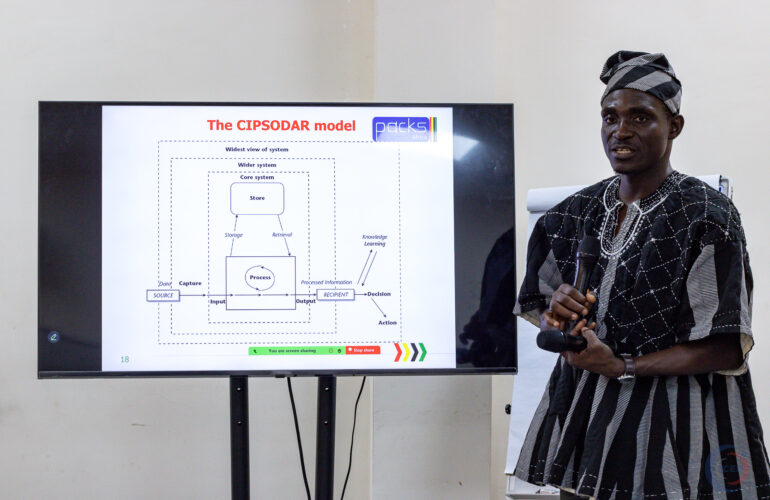
As Africa moves toward a future anchored in justice, equity, and sustainability, conversations around governance are becoming more urgent. This urgency was powerfully echoed during a recent breakout session on Governance, Participation & Accountability in Ghana’s Public Institutions, hosted by PACKS Africa and its partners as part of the Evidence to Action (E2A) Conference 2025.
The conference, which was organised by the International Centre for Evaluation and Development (ICED) under the broader theme of “Advancing Participatory Governance for Sustainable Development in Africa”, convened a formidable panel of experts and practitioners to dissect the state of governance in Ghana and what must change to build a more responsive, inclusive and transparent system.

Governance, Participation & Accountability in Ghana’s Public Institutions
Presenting during the breakout session, Jane Geraldo-Acolatse from the Ghana Statistical Service opened with sobering data from their Governance Statistics Series. She highlighted persistent trends that point to a deficit in public trust: gift-giving for basic services, low citizen participation at the local level, and weak accountability mechanisms across institutions.
To curb this, participants suggested that corruption must be tackled from the ground up. Notably, Samuel Harrison-Cudjoe of the Ghana Anti-Corruption Coalition (GACC) reminded attendees that corruption thrives not just in the corridors of power but in the everyday spaces where citizens interact with the state. He called for anti-corruption campaigns to be decentralized to rural communities and schools, and noted that resource limitations in public offices often breed favoritism and shortcuts.
From the legislative perspective, Issifu Lampo of African Centre for Parliamentary Affairs (ACEPA) stressed the need for clear mandates for public officials and more robust government reporting obligations. His message was direct: citizen empowerment and institutional clarity must go hand-in-hand.
Picking up the baton, Awal Mohammed of the Ghana Center for Democratic Development (CDD-Ghana) argued that governance must not be treated as a one-time election ritual. He called for Metropolitan, Municipal, and District Chief Executives (MMDCEs) to institutionalize ongoing citizen engagement, ensuring that governance is felt in real time, not just at the ballot box.
Financing Civil Society: Between Independence and Sustainability
On the sidelines of the conference, another panel titled “Financing Civil Society: Balancing Independence and Sustainability” sparked equally critical discussions, where PACKS Africa’s Executive Director, Kirchuffs Atengble, joined distinguished panelists to reflect on the increasingly precarious financial future of Civil Society Organisations (CSOs) in Ghana.
Kirchuffs emphasized the need to domesticate funding sources, pointing to recent foreign donor withdrawals as a wake-up call. “We must reimagine how CSOs sustain their work without compromising their independence,” he noted.

Prof. Takyiwaa Manuh from CDD-Ghana added a striking insight: “Local banks and even government institutions do not fully appreciate the developmental role of CSOs and as a result, they rarely invest in them.” Thus, her call to action was loud and clear: Africans must take ownership of their development agenda, with governments stepping up to fund and support local CSOs in meaningful, long-term ways.
From Evidence to Action: What Comes Next?
The panel discussions perfectly encapsulate the objectives of the E2A 2025 Conference – to bridge research, policy, and practice through evidence-based, people-driven governance solutions. The message from the breakout sessions were resounding: Strong institutions don’t happen by chance, they’re built by engaged citizens, responsive leaders, and a system that values accountability over convenience. As Africa marches toward Agenda 2063 and the Sustainable Development Goals, it is this model of inclusive, participatory governance that must light the path forward.




